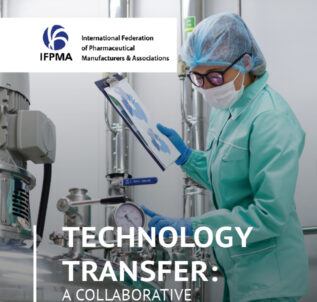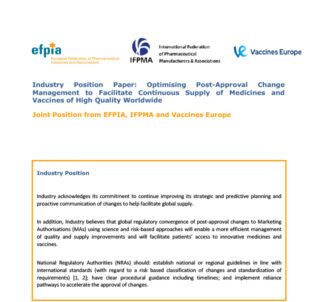Key considerations on the scope, utility and processes around updating the WHO Essential Medicines List
The WHO Essential Medicines List (EML) is an important tool in global health and supports the achievement of the UN Sustainable Development Goals. IFPMA has published perspectives from the R&D-based industry on the utility and scope of the EML. This position paper represents IFPMA’s perspective as of April 2023, ahead of the publication of the revised version of the EML.
Key points
- The R&D-based biopharmaceutical industry, which is at the forefront of developing innovative treatments, recognizes the value of the EML as a foundational list of medicines that meet many of the priority healthcare needs of national health systems and their populations. As a reference list, the EML should not limit governments, healthcare professionals or patients from adopting other treatment options which may not be listed in the EML but are deemed appropriate at a national level.
- The inclusion of innovative medicines on the EML can enable improved population health only if there is wide access to those medicines. To maximize access, broader healthcare system investments are needed to support efficient and effective access, delivery and uptake (i.e. devising innovative financing and payment methods, improving health workforce balance and quality, improving service delivery infrastructure and accessibility, etc). This is especially the case for products on the complementary list that frequently require additional infrastructure and specialized healthcare workers (e.g., cancer, rare diseases).
- EML expansion should lead to patient-centric collaborative efforts among governments, payers, civil society, international agencies and the pharmaceutical industry to identify appropriate sustainable approaches with long-term durable impact with regard to safe and effective uptake of essential medicines to the benefit of patients and populations.
- The decision on whether to include medicines on the EML should be based on the evidence on medical need, clinical efficacy, available real-world evidence and infrastructural requirements. The development of EML should not be based on implicit rationing that does not take societal perspective into account nor should it be guided purely by cost containment objectives.
- The WHO should prioritize providing an accurate summary of the data available on clinical effectiveness and safety, whether it is representative of the situation in lower resource settings as well as a summary of the minimal infrastructure requirements to implement a new technology. The WHO should acknowledge where there are data gaps and be cautious about making recommendations on inconsistent data. A generalized cost-effectiveness assessment that does not take into consideration each country’s national context will have limited value in informing decision-making and EML recommendations.
- Given the influence of the EML in structuring basic national benefit packages in low- and middle-income countries, it is important that the processes around the EML are open, inclusive and impartial. Informal advisory groups that establish criteria for EML inclusion (i.e. cancer medicines working group) should include experts with relevant expertise, including from industry, academia and national regulatory agencies who can provide expert advice and knowledge.
- Principles underpinning inclusion of medicines on the EML should be in line with the primary scope and purpose of EML. WHO should not promote policies or utilise approaches that disregard value and undermine innovation such as compulsory licensing.
About IFPMA
IFPMA represents the innovative pharmaceutical industry at the international level, engaging in official relations with the United Nations and multilateral organizations. Our vision is to ensure that scientific progress translates into the next generation of medicines and vaccines that deliver a healthier future for people everywhere.
ifpma.org
To achieve this, we act as a trusted partner, bringing our members' expertise to champion pharmaceutical innovation, drive policy that supports the research, development, and delivery of health technologies, and create sustainable solutions that advance global health.





